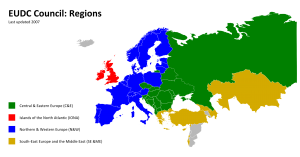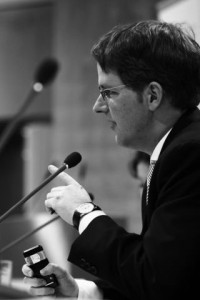Have you ever heard of the EUDC Council? / Jens Fischer about managing the European debating scene
Even old stagers among those debating in the German speaking scene do very often not know what the EUDC Council really is. First things first: EUDC stands for European Universities Debating Championships a.k.a. Euros. But what is it that hides behind the “Council”?
The one who knows about it in detail is Jens Fischer from Berlin Debating Union. He has been re-elected president of EUDC Council at this year’s Euros in Amsterdam. When Achte Minute asked him about his being voted, he laughed – his old and new office comes with a great workload rather than fame.
Well, at least a little fame might be part of it since the EUDC Council under its president is assigned to set the basic regulations for debating on a European level – a task that is invisible to most participants of the Euros, but which is essential to the success of the annual tournament. There was a lot to be done beforehand which required delving into the issue, Jens reported.
As head of the Council that takes place in the course of each EUDC tournament, Jens Fischer does not get a vote in decisions. The Council is made up of the delegates, one from each country participating in the current Euros. The most substantial decision the Council has to make is the allocation of the following year’s EUDC. This year, the conclusion was beyond dispute since there was only one bid for the EUDC 2011: After answering all questions on their budget for instance, there was a broad majority plus enthusiastic Paddies – next year’s Euros will be hosted by the National University of Ireland at Galway! As if celebrating this decision, an Irish team won Amsterdam’s EUDC two days later.
 Other important offices of the EUDC Council’s executive board are the Registrar (currently Branka Marusic from Zagreb, Croatia) and the Secretary (Rob Honig from Leiden, The Netherlands). The former is in charge of adherence to the Council’s regulations during meetings while the latter takes the minutes during those sessions. Then there are four vice presidents supporting the president. Each of them is the reference person for a greater region: Adriaan Andringa from the Netherlands for Northern and Western Europe (N&W), Milan Vignjevic from Serbia for Central and Eastern Europe (C&E), Ruth Faller from Ireland for the Islands of the North Atlantic (IONA) and Manos Moschopoulos from Greece for South-Eastern Europe and the Middle East (SE&ME). They are the go-to guys for debating societies that run for EUDC for the first time.
Other important offices of the EUDC Council’s executive board are the Registrar (currently Branka Marusic from Zagreb, Croatia) and the Secretary (Rob Honig from Leiden, The Netherlands). The former is in charge of adherence to the Council’s regulations during meetings while the latter takes the minutes during those sessions. Then there are four vice presidents supporting the president. Each of them is the reference person for a greater region: Adriaan Andringa from the Netherlands for Northern and Western Europe (N&W), Milan Vignjevic from Serbia for Central and Eastern Europe (C&E), Ruth Faller from Ireland for the Islands of the North Atlantic (IONA) and Manos Moschopoulos from Greece for South-Eastern Europe and the Middle East (SE&ME). They are the go-to guys for debating societies that run for EUDC for the first time.
The matter of which society is entitled to take part in the EUDC and which is not is an old dispute at EUDC Councils. However, for the time being, the dispute was settled at Amsterdam – the status quo is preserved. The basic idea behind the EUDC: It is an intervarsity, i.e. universities compete for the European debate championship. It is assumed that at any one university there is just one debating society. But ever since the inception of the Euros in 1999, that assumption was not adhered to. Some universities host up to four debating societies which all send teams to the Euros, while other universities are misrepresented since they are covered by just one society.
This imbalance led to ambiguity. Now, the Council aims at pursuing the original goal – universities competing at an intervarsity. Still, all debate societies that took part in the various EUDC tournaments between 2006 and 2009 may take part further on. Other societies that are not clearly associated to a university are asked to confer with the vice-president in charge of their respective region, which in the case of Germany is Northern and Western Europe.
Even countries that geographically are not part of Europe proper are allowed to attend Euros. Israel for instance is a welcome competitor at EUDC – a successful one as well: In 2009, a team from Tel Aviv made it to the Main Break Final where mainly English native speakers compete for the title. Indeed, Qatar, an Arab emirate at the Persian Gulf, participated in this year’s EUDC at Amsterdam for the first time since there is nothing next to an Arab debating scene.
Another task Jens is planning to tackle is EUDC’s sponsoring. Along the lines of the model that is installed in Germany between VDCH (the Association of Debating Societies at Universities) and the weekly news magazine DIE ZEIT, he and his team are looking for a long term financier that backs the EUDC permanently. In addition, Jens wants to broaden the range of the EUDC Council’s web presence. Already, you will find interesting info there such as the history of the Euros since 1999.
Altogether, Jens evaluates the working atmosphere in the Council as being more positive: “Nowadays, people are more ready to talk to each other.” That has not always been the case, Jens criticizes. But he is delighted that, moreover, working on the panel has become better and more precise. “The Council is what you make of it”, the president concludes. Jens wants to make the best of it – ahead of him lies a year with a workload full of commitment for the case of European debating.
Xenia Zykhar / glx / apf







Sehr informativ und übersichtlich, toller Artikel 🙂
Ja, ich hab mich auch schon häufig gefragt, was das EUDC so macht! 😉